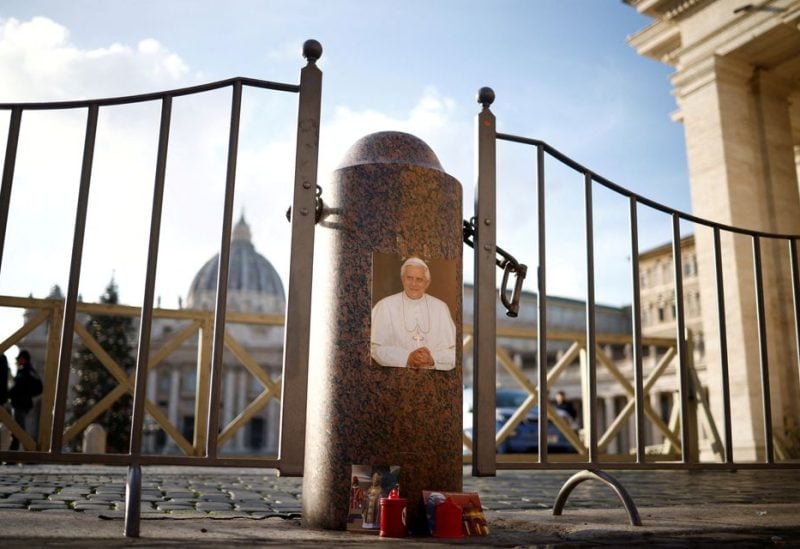
Candles stand next to St. Peter's Square after former Pope Benedict died in the Vatican, in Rome, Italy, December 31, 2022. REUTERS/Guglielmo Mangiapane
Pope Francis observed the Roman Catholic Church’s customary World Day of Peace, but the beginning of the new year at the Vatican was overshadowed by Benedict’s passing.
Francis presided over a Mass in St. Peter’s Basilica as Benedict’s remains was being readied for a three-day public viewing that would begin on Monday. Benedict passed away on Saturday at the age of 95.
In accordance with Benedict’s wishes, his funeral on Thursday will be simple, solemn and sober. It will be the first time in many centuries that a sitting pope will preside at the funeral of his predecessor. Benedict, who stepped down in 2013, had been the first pontiff in 600 years to resign.
Jan. 1 is also the feast of the Mother of God and in his homily, Francis asked the Madonna to accompany “our beloved” Pope Emeritus Benedict “on his passage from this world to God”.
Benedict was also remembered in one of the prayers at the Mass.
Francis also appealed for peace, alluding to war-torn countries, including Ukraine, where Russia continued intense attacks on New Year’s Day.
“Let us pray to our Mother in a special way for her sons and daughters who are suffering and no longer have the strength to pray, and for our many brothers and sisters throughout the world who are victims of war, passing these holidays in darkness and cold, in poverty and fear, immersed in violence and indifference,” he said.
On Saturday night the Vatican released Benedict’s two-page “spiritual testimony” written in 2006, a year after his election as pope. There was no explanation why Benedict did not update it as he became older and more frail.
In it, he asked in a general, spiritual way, that God would welcome him to internal life “despite all my sins and insufficiencies”.
Francis on Saturday called Benedict a noble, kind man who was a gift to the Church and the world.
While tributes to the former pope continued to be made by world leaders, and conservative members of the faithful, others were highly critical of his pontificate.
Some recalled the severe discipline he meted out to progressive theologians, particularly in Latin America, when he was head of the Vatican’s doctrinal department under Pope John Paul II. Those actions prompted liberal Catholics to dub then Cardinal Joseph Ratzinger “God’s Rottweiler”.
And while some have credited Benedict with taking important steps to formalise the Vatican’s response to clergy sexual abuse, victims groups accused him of protecting the institution at all costs.
“In our view, the death of Pope Benedict XVI is a reminder that, much like John Paul II, Benedict was more concerned about the Church’s deteriorating image and financial flow to the hierarchy versus grasping the concept of true apologies followed by true amends to victims of abuse,” the anti-abuse group SNAP said.
Like many Vatican officials who worked with Benedict, Canadian Cardinal Marc Ouellet said he believed the German pontiff had left behind “a great legacy” as a man of God and a man of culture.
“I believe this is also a task for the future, to deeply rethink the Christian faith in the face of the challenges of our time,” Ouellet told Reuters Television.